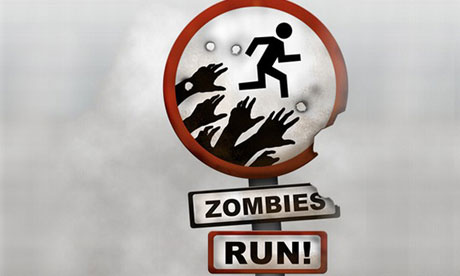Lately, I’ve been experiencing and hearing a certain problem from leaders on a regular basis. They need resourceful employees, but are faced with employees who are not thinking for themselves, who abdicate or ignore problems rather than investigating and resolving them, and who aren’t able to think through solutions to new problems they run into.
If you manage people or support and guide leaders who manage people from an employee relations standpoint, chances are you’ve encountered under-resourceful employees. As I thought about this issue, I couldn’t help but think about the role that zombies and gaming has played in my life and the lives of many resourceful employees I have worked with.
In today’s work world, the only constant is change, and if you’re not able to adapt, re-invent your processes and your role, and create new ways of doing new things, you are in trouble. I realize that change is scary for most, but the ability to adjust what you do, use your resources to help you, and to search for new solutions, is fundamental to success today.
So what the heck does being a good, resourceful employee have to do with killing zombies?
Killing Zombies forces you to utilize your resources effectively.
If you’ve ever played Dead Island or one of the many other zombie games, you know that you are faced with different dangerous situations, enemies, and problems constantly. You have to use various weapons, make new weapons, and change the way you’re playing in order to survive.
In the workplace, this is akin to trying different technologies, programs, and creating new processes to drive efficiency. These practices are critical in today’s work world.
When killing Zombies, your next life is only a click away.
I canot tell a lie. I am not the best zombie-killer. I die. A lot. But when you’re gaming, dying is okay. You often have several lives or an opportunity to start over again at a save point, so you can practice trial and error in your approach without serious consequences, learning from each attempt and eventually coming out victorious.
This trial, error, adjust and win concept helps develop innovation in the workplace. Trying different tactics, finding solutions that you haven’t employed before, and attempting new things all help to create more innovative processes and products. If what you build or try doesn’t work, you can take the learning and try something more effective.
Gaming encourages strategic thinking.
It’s not actually just about zombies. Growing up, my sister and I didn’t play the simple games of chance that most kids did – you know the ones where you rolled a die, moved your gamepiece, and then simply followed the directions to your next move – like Snakes and Ladders or Candy Land. We were playing strategic games like Risk and Monopoly with adults at a very young age. In games like these, you develop a strategy – how many armies will you create? Will you try diplomacy? Are you going to buy Park Place and Boardwalk and hope for fewer larger payouts or buy several smaller properties, fill them with houses and hotels, and bring in profit from more frequent, smaller payouts? When playing games, you get the opportunity to try different strategies over time, see how they work, and find what works best for you.
This translates into employees as an inclination to try various solutions, measure success, and determine the best one for each issue you run into. The negotiation and diplomacy skills you practice in strategic board games also translate into performance in the board room.
So what now?
I’m not suggesting you add an xBox to the staff room or encourage game-playing during meetings, but think about ways to incorporate gaming into the development and coaching of your employees. Some ideas might be to :
- Incorporate fun problem solving into meetings as an icebreaker to stimulate creativity
- Give employees a “restart” button for mistakes to encourage new ideas without negative repercussions
- Have brainstorming sessions to review various strategies and resources available to people, broadening their minds to the possibilities.
And if all that fails, kill some zombies in a game of Dead Island to work off your frustration at your non-resourceful employees!



